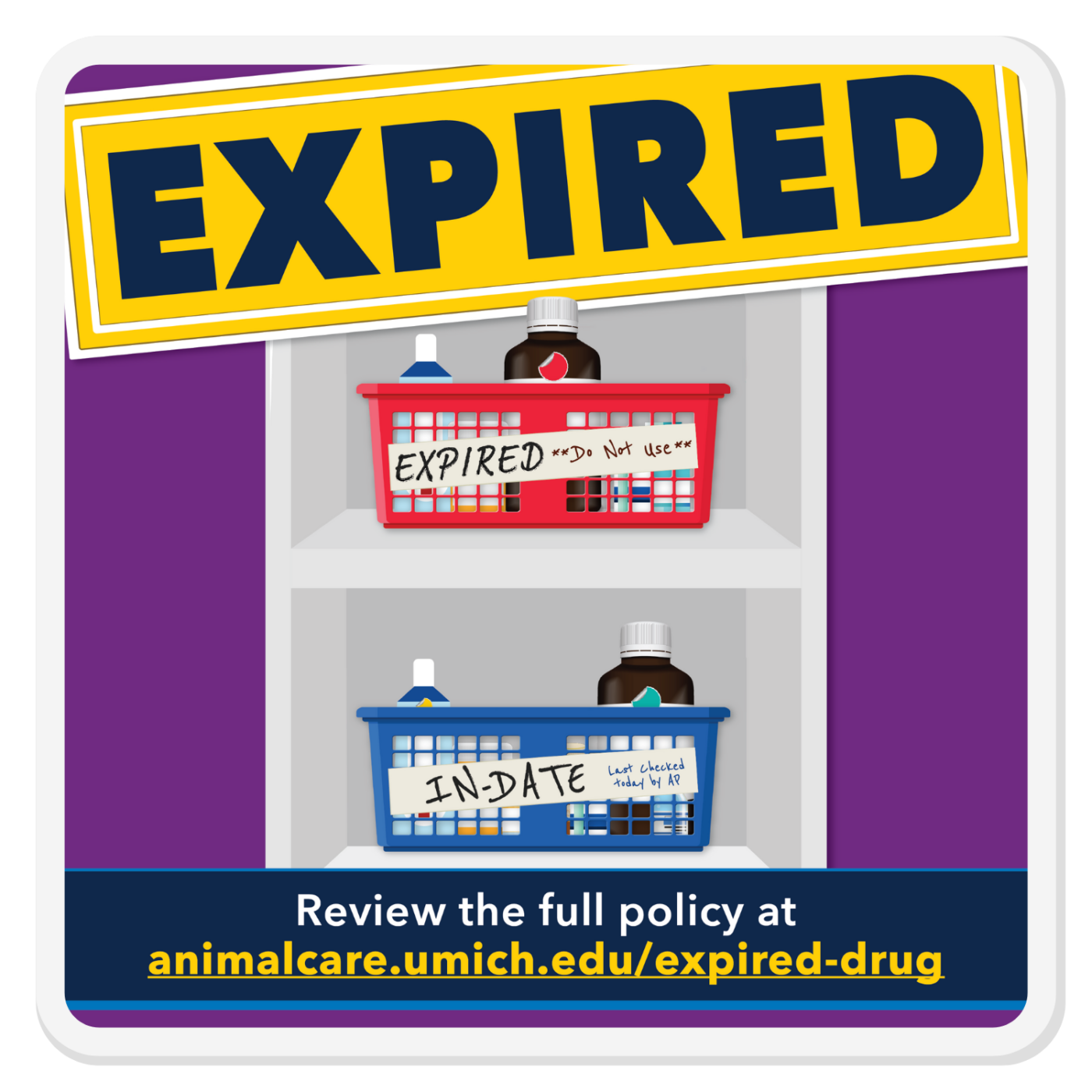Earlier this fall, we shared several important updates that will impact our research operations moving forward, including preparations for the U-M’s next re-accreditation visit by AAALAC, International in Summer 2023.
Today, we are providing additional information on two of these updates – the revised Policy on the Use, Storage, and Expiration of Substances, Agents, and Medical Materials Used in Animals and, regretfully, a recension of extended Carprofen storage times first announced in January 2022.
The Institutional Animal Care & Use Committee (IACUC) updated this policy to:
- More clearly define expectations for the appropriate use and storage of expired drugs and medical materials in animal activities, and
- More closely align with the federal rules and regulations that govern the use of animals in research.
The administration and/or use of expired drugs and other substances not only endangers animal welfare but could also compromise the validity of your results.
Given the seriousness of these concerns and the potential for resulting non-compliance, we ask that all individuals who handle or work with animals as part of their research operations review the following information carefully:
- The revised policy further clarifies that NO EXPIRED fluids, vehicles, biologics, or drugs – including all anesthetics, analgesics, euthanasia agents, pharmaceuticals, therapeutics, and non-pharmaceutical grade drugs – can be administered to, or used in, animals for ANY veterinary procedure, including euthanasia or any procedure in which the animal is euthanized prior to recovery.
- Expired surgical materials and supplies – such as sutures, gauze, and catheters – can be used for non-recovery surgeries or anesthetic events (i.e., a surgery, procedure, or anesthetic event in which the animal is euthanized prior to recovery from anesthesia), PROVIDED THAT usage does not adversely affect the animal’s well-being or potentially compromise the validity of the scientific study.
- Items must be clearly labeled as expired and segregated from non-expired items until they can be appropriately discarded. Questions regarding the disposal of hazardous waste should be directed to EHS at [email protected] or (734) 763-4568.
- Information regarding the preparation, storage, and expiration of pharmaceutical grade drugs and sterile fluids can be found in the Guidelines on the Preparation of Injectable Substances and Agents Administered to Animals.**
**Carprofen Users**
Recent information from the federal Office of Laboratory Animal Welfare (OLAW) requires us to rescind the extended “Beyond Use Date” for both diluted and undiluted Carprofen that was first announced in January 2022.
As such, this agent must be used and discarded according to the manufacturer’s recommendations.
We deeply apologize for any confusion this guideline retraction has caused.
The Guidelines on the Preparation of Injectable Substances and Agents Administered to Animals have been updated to reflect this important change in practice.
- Some pharmaceutics (e.g., items removed from their original container for dilution or combination with other agents) may have a “Use By Date” that differs from the product’s original expiration date. When a product’s shelf life is modified (i.e., shortened) based on when the product is opened for use/dilution, use whichever date (either “Use By Date” or “Original Expiration Date”) occurs first to determine the product’s expiration.
- Controlled substances/drugs must be stored securely in accordance with both U-M requirements and State of Michigan and DEA regulations. Additional information can be found on the Controlled Substances in Research Monitoring Program website.
- Appropriately discard all expired surgical materials and supplies. IF expired surgical materials or supplies are to be used for non-recovery surgeries or anesthetic events, items must be:
- Clearly labeled (e.g., “Expired: non-recovery use only”)
- Segregated from non-expired items to avoid accidental use
- Stored according to the manufacturer’s recommendations
These changes – which are driven by federal oversight bodies – should be implemented immediately; including the recension of extended Carprofen storage times.
After January 1, 2023, the IACUC expects that individuals who are found to be conducting procedures inconsistent with institutional policies and/or their IACUC approved protocol(s) will be reported for non-compliance, pursuant to standard practices. IACUC inspectors may also inquire about these updates during the Winter 2023 round of semi-annual inspections, tentatively scheduled for February and March.
Questions?

Members of both our veterinary care and compliance teams are here to provide the guidance and assistance necessary to answer any additional questions or concerns you may have about these important changes.
- Contact the Quality Assurance Team in the Animal Care & Use Office ([email protected]) for assistance with establishing a system to monitor for expired drugs and other medical materials in your lab.
- Specific questions about the proper use of drugs and other medical materials in animals should be directed to your ULAM Faculty Veterinarian.
Thank you for taking an active role in safeguarding animal welfare and maintaining programmatic compliance. Ensuring that drugs and other medical materials are used in accordance with this policy and nationally-accepted standards is one of the most important responsibilities bestowed upon us when afforded the privilege of working with animals in research.
Your efforts and attention to this matter are greatly appreciated.
